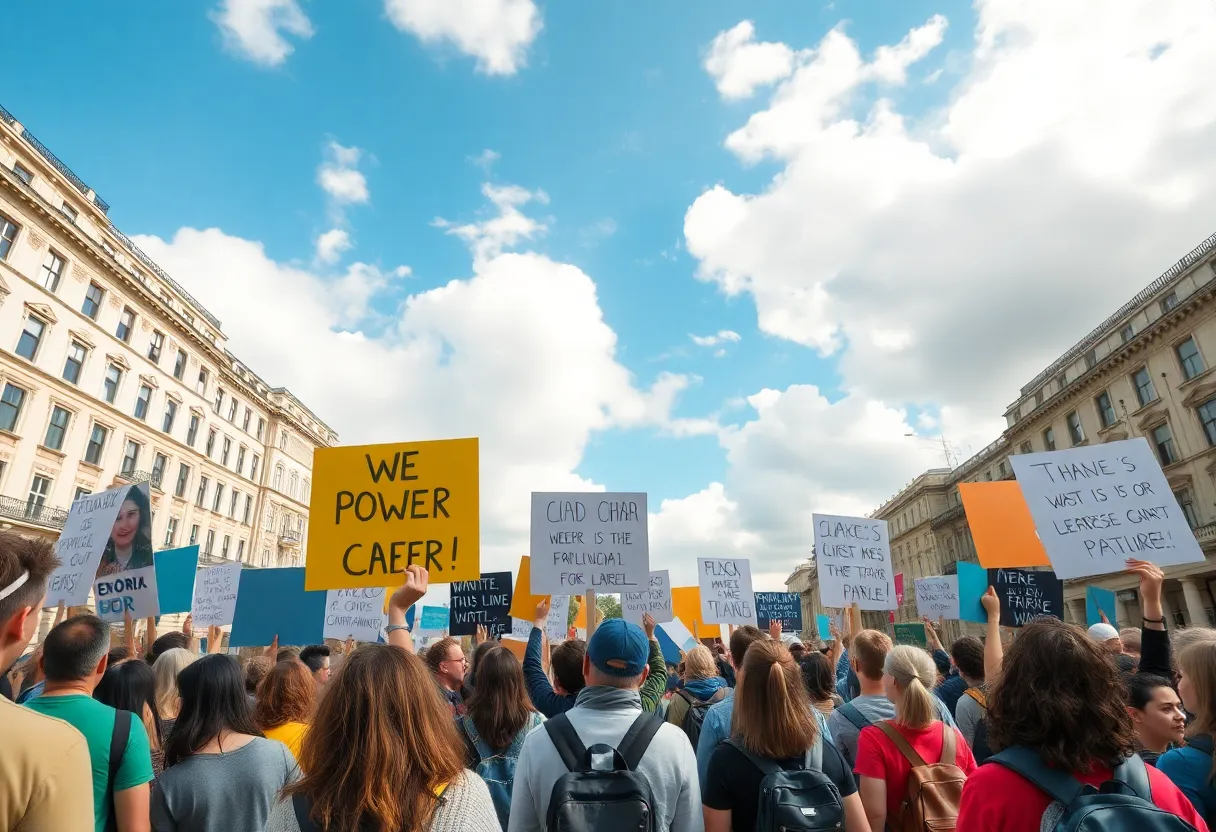Louisville, October 18, 2025
Over 500 participants gathered in Louisville for a ‘No Kings’ protest as part of a nationwide movement against authoritarianism. Organized by grassroots groups, the demonstration featured a march from City Hall to Jefferson Square, emphasizing the importance of civic engagement. Attendees carried signs and shared personal stories of inequality, showcasing the inclusiveness of the coalition which included labor unions, activists, and students. The event aimed to inspire ongoing dialogue on democracy and accountability, with plans for future voter registration drives to maintain momentum.
Louisville Sees ‘No Kings’ Protests as Part of Nationwide Movement
Louisville witnessed a significant ‘No Kings’ protest on Saturday, drawing over 500 participants in a nationwide effort against authoritarianism. The event, organized by grassroots groups, involved a march from City Hall to Jefferson Square, where attendees carried signs protesting executive overreach. This demonstration highlighted concerns over recent policy controversies and emphasized the importance of civic engagement.
Key aspects of the event included peaceful monitoring by police, with no arrests reported. Participants shared personal stories related to inequality, fostering a sense of unity among the crowd. The diverse coalition comprised labor unions, activists, and students, all chanting slogans like ‘Power to the People’ under partly cloudy skies. Organizers have announced plans for follow-up activities, including voter registration drives, to sustain momentum amid rising midterm tensions.
This protest is part of a broader nationwide movement that promotes dialogue on democracy and accountability. The event in Louisville reflects a growing commitment to community action, as similar efforts gain traction across the country. Coverage of the demonstration helped amplify the voices of those involved, reinforcing the ongoing push for change.
Building on the event’s core elements, the march represented a collective stand against perceived threats to democratic principles. Participants emphasized the need for ongoing civic involvement, drawing from experiences of inequality to build solidarity. The involvement of various groups, such as labor unions and students, showcased the event’s inclusive nature, uniting diverse perspectives in a shared cause.
Weather conditions played a minor role, with partly cloudy skies providing a backdrop for the chants and speeches. Speakers at the event focused on recent policy controversies, urging attendees to engage more actively in democratic processes. This approach aimed to inspire broader participation, linking local actions to larger nationwide trends.
The protest’s peaceful execution, monitored by police without incident, allowed for open expression and community interaction. Stories of inequality shared during the march added a personal dimension, highlighting how authoritarianism affects everyday lives. Such narratives strengthened the event’s message, encouraging a deeper commitment to accountability.
The ‘No Kings Day’ initiative, as seen in Louisville, is part of a nationwide push that echoes similar events elsewhere. It underscores the movement’s focus on executive overreach and the need for voter engagement. With plans for follow-up drives, organizers seek to maintain this energy, fostering ongoing discussions on democracy.
In the context of current midterm tensions, these protests represent a vital form of expression. The diverse participation, including from activists and students, illustrates the widespread support for anti-authoritarianism efforts. As the event concluded, the persistence of this commitment signals potential for future actions, inspiring communities across the nation.
Historically, such gatherings build on past events where inequality and executive actions have been key issues. In Louisville, the coalition’s composition reflects a broad base of support, with grassroots groups leading the charge. This nationwide movement continues to evolve, promoting dialogue and action to address these concerns.
The event’s emphasis on voter registration drives highlights a practical step toward change, encouraging participants to translate their protests into electoral influence. Overall, the Louisville demonstration contributed to a larger narrative of resistance, reinforcing the importance of collective voices in shaping democratic outcomes.
To provide more depth, the march’s route from City Hall to Jefferson Square symbolized a journey toward accountability, with signs and chants serving as visible reminders of the nationwide push. This event not only addressed immediate issues but also laid groundwork for sustained community involvement, adapting to the evolving political landscape.
Background on the Movement
The ‘No Kings’ protests stem from a nationwide effort to combat authoritarianism, with roots in responses to executive overreach and policy controversies. In Louisville, this event drew from local experiences of inequality, mirroring broader trends across the country. The movement gains traction during periods of political tension, such as midterms, encouraging civic engagement and dialogue on democracy.
Participants in Louisville represented a cross-section of society, including labor unions, activists, and students, showing how these issues resonate widely. The peaceful nature of the protest, with no arrests, underscores the commitment to lawful expression. As part of ongoing efforts, these events inspire action and foster a sense of community accountability.
Expanding on the nationwide scope, similar protests elsewhere have highlighted the same themes, contributing to a collective push for change. In Louisville, the event’s success in drawing over 500 people demonstrates the potential for local actions to influence larger movements, all while maintaining a focus on democratic principles.
Through these gatherings, organizers aim to build momentum for voter registration and other initiatives, ensuring that the voices raised during protests lead to tangible outcomes. This approach not only addresses current controversies but also prepares participants for future civic responsibilities, strengthening the fabric of democracy nationwide.
The movement’s emphasis on sharing stories of inequality adds a human element, making the abstract concept of authoritarianism more relatable. In Louisville, this strategy helped unite diverse groups, creating a powerful coalition for change. As ‘No Kings Day’ events continue, they serve as a reminder of the ongoing need for vigilance and participation in democratic processes.
Concluding the background, the Louisville protest is a microcosm of the nationwide trend, where grassroots efforts drive conversations on executive accountability. With coverage amplifying these messages, the movement persists, inspiring communities to remain engaged and proactive.
Key Features of the ‘No Kings’ Protests
The protests feature elements like large-scale marches, diverse participation, and calls for civic action, all aimed at addressing authoritarianism nationwide.
Frequently Asked Questions
What was the main focus of the ‘No Kings’ protests in Louisville?
The protests focused on a nationwide push against authoritarianism, with participants marching to decry executive overreach.
How many people participated in the Louisville event?
Over 500 marched from City Hall to Jefferson Square.
Were there any incidents during the protest?
Police monitored peacefully, with no arrests reported.
What groups were involved in the coalition?
Louisville’s diverse coalition included labor unions, activists, and students.
What chants were heard during the event?
Chants of ‘Power to the People’ filled the air.
What are the organizers planning next?
Organizers plan follow-up voter registration drives.
How does this event relate to broader contexts?
This movement gains traction amid midterm tensions, fostering dialogue on democracy.
What was the atmosphere like?
Under partly cloudy skies, participants shared stories of inequality.
Key Features Chart
| Feature | Description |
|---|---|
| Participation | Over 500 participants in Louisville march |
| Focus | Nationwide push against authoritarianism |
| Coalition | Includes labor unions, activists, and students |
| Chants | ‘Power to the People’ |
| Next Steps | Follow-up voter registration drives |
| Context | Gains traction amid midterm tensions |
Deeper Dive: News & Info About This Topic
HERE Resources
Louisville Hosts Peaceful Protests Against Political Elitism
Police Dismantle Pro-Palestine Encampment at University of Louisville
Local Universities in Louisville Show Mixed Results in College Rankings
Kentucky and Louisville Basketball Teams Ranked in Top 25
University of Louisville Baseball Team Hosts Inclusion-Focused Mentoring Event
Assumption High School Edges Mercy Academy in Volleyball Thrill
Louisville High School Football Thrives Amid Challenges
Bellarmine Volleyball Dominates Queens in ASUN Match
Proposed Rezoning Plan to Combat Middle School Overcrowding in Louisville
University of Louisville Inaugurates New President Amid Protests





